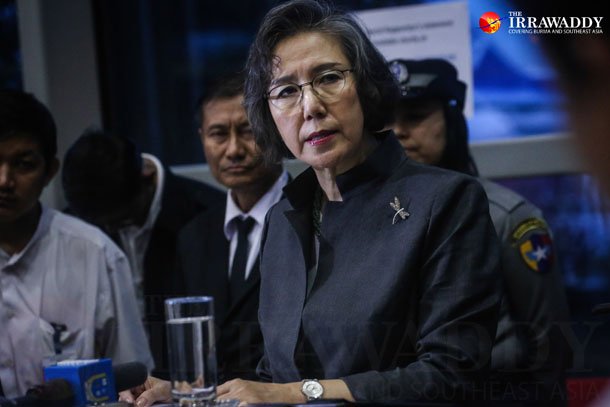The Facts are Plain and Stated. It is Time to Act!
By Burma Partnership • January 19, 2015 The US Special Envoy for Human Rights in Burma, US Assistant Secretary of State Tom Malinowski and his accompanying delegation, completed the second trip of this kind, highlighting the plethora of grave human rights concerns that continue to plague the people of Burma. On the same day, the UN Special Rapporteur on the situation of human rights in Burma, Yanghee Lee, also gave a stark analysis of progress in human rights.
The US Special Envoy for Human Rights in Burma, US Assistant Secretary of State Tom Malinowski and his accompanying delegation, completed the second trip of this kind, highlighting the plethora of grave human rights concerns that continue to plague the people of Burma. On the same day, the UN Special Rapporteur on the situation of human rights in Burma, Yanghee Lee, also gave a stark analysis of progress in human rights.
The two day, US-Myanmar Human Rights Dialogue visit included meetings with Union ministers in a closed door arrangement in Naypyidaw as well as meetings with civil society in Rangoon and Myitkyina, the capital of war-torn Kachin State. The 10-day trip of Special Rapporteur Yanghee Lee also included meetings with various government and civil society representatives, as well as visits to the site of the Letpadaung Copper Mine, Insein Prison, Arakan State, and Lashio, northern Shan State.
Both delegations stated recent religious violence and tension as a pressing need to address. US Assistant Secretary of State for Democracy, Human Rights and Labor Tom Malinowski noted, “The use of religion in particular to divide people, whether it is done for political or other purposes, is incredibly dangerous,” while Special Rapporteur Yanghee Lee directly clarified the right for Rohingya to self-identify; “Fundamental rights are not hierarchical – they aren’t conditional upon one another. They’re inalienable. You can be assured that in all my meetings with government interlocutors, I use the word ‘Rohingya’. The rights of Rohingya people must be protected, promoted and upheld,” while also stating that the situation in Arakan State “remains at crisis stage.” Other issues discussed by both delegations include legal reforms, land rights and the new land use policy, as well as ethnic conflict.
While the very existence of such visits are commended by both delegations, the irony of the promises made by the Burma Government to such high-profile actors is not lost on the uncountable victims of human rights abuses at the hands of the Burma authorities. The US delegation statement explains that, “Both governments reaffirmed their obligations under the Geneva Conventions to protect civilian populations at all times and all places.” Yet on 15 January 2015, just after the US delegation arrived in the country, clashes between the Burma Army and the Kachin Independence Army left around a thousand civilians displaced and in desperate need of help. The Burma Army certainly did not adhere to its obligations under the Geneva Conventions, as Ko Kar Gyi of the Kachin Development Network Group explained, “Military forces closed the way to the conflict area as religious leaders and civil society groups were attempting to rescue local people who are in the danger zones.”
At a press conference after their meeting with the UN Special Rapporteur, members of the Coordination Committee for Civil Society Organizations Forum iterated concerns they have over the current state of the reform process, concerns that were also conveyed to the US delegation. These included the government’s continued use of various old and newly enacted laws as a tool to; repress human rights activists, discriminate against women in the name of national race protection, and to disenfranchise farmers to facilitate investment.
That a broad forum of civil society organizations in Burma continues to highlight various forms of serious human rights abuses is testament to the grave situation that many people in Burma face today. That two remarkably high profile delegations, from the UN and the US Government, further note and even add to these concerns in the same week reflects the gravity of human rights problems in Burma despite gushing praise of the process in many international circles. The international community must reflect on these statements and confront the reality of the situation in Burma. Condemnation is just the first step. Concrete action must be taken that shows that the Burma Government cannot continue to inflict suffering on its own people with impunity. Further investment and official support of policies and programs of the Burma Government results in complicity in such violations. There can be no denial of the reality of the situation of human rights in Burma and the reform process. This reality is plain to see and stated clearly by influential local and international actors. This year of 2015 is of upmost importance for the future of Burma given the necessity of an inclusive political dialogue towards national reconciliation as well as the opportunity to amend the 2008 Constitution and to hold genuine free and fair elections. It is time for the international community to show their commitment and act to ensure that these fundamental changes are realized.
Tags: Arakan State, Burma Army, Burma Partership, Coordination Committee for Civil Society Organizations Forum, Geneva Conventions, Insein Prison, Kachin Development Network Group, Kachin Independence, Kachin State, Letpadaung Copper Mine, Myitkyina, Northern Shan State, Special Rapporteur, Tom Malinowski, US Special Envoy for Human Rights in Burma, US-Myanmar Human Rights Dialogue, Yanghee LeeThis post is in: Blog
Related PostsU.S.: Lifting Sanctions on Myanmar Puts Human Rights Progress At Risk
Advisory Commission on Rakhine State – A Welcome Investigation into Arakan State’s Human Rights and Humanitarian Crisis
NLD Government Must Lift All Aid Restrictions in Arakan State
United States Commission on International Religious Freedom – Burma: 2016 Annual Report
(၂၉) ႏွစ္ေျမာက္ စစ္ေတြဆန္ျပႆနာေန႔ ဝမ္းနည္းေအာက္ေမ့ဖြယ္ အထိမ္းအမွတ္ သေဘာထားထုတ္ျပန္ခ်က္









 All posts
All posts